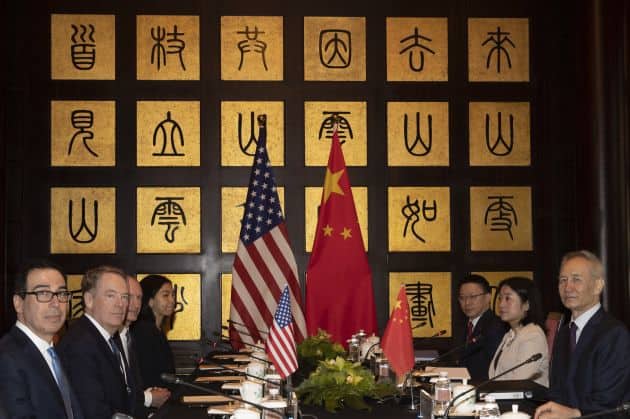By Trade Correspondent L.C. and the Editor:

Trade wars, as commentators have warned, are a bit like “roach motels.” Once you go in, it’s very hard to exit.
China’s President Xi and US President Trump are now playing a high stakes game of “Take that, motherf…” China just responded today by letting its currency depreciate to 7.14 yuan to the dollar to obtain a competitive edge in exports. The US Treasury responded by officially designating China as a currency manipulator. China is also drastically cutting back on agricultural imports from the US in an attempt to alienate President Trump’s politically important Midwest farm base.
The Chinese moves are in retaliation for President Trump’s surprise announcement on August 1st that on September 1st he will impose a 10% tariff on remaining imports from China not yet subjected to Section 301 tariffs (the so-called List 4 goods).
Faced with the prospect of unending, escalating trade war between the world’s two largest economies, the US stock market by Monday’s closing bell had dipped a further 3% from last week’s 3% decline.
All but one of the US president’s close advisors – the exception being Peter Navarro – had initially argued against the president’s unexpected 10% tariff announcement.
Why did President Trump make his fateful move? He listened to the report of his two advisors returning from talks with their counterparts in Shanghai on July 30th-31st and didn’t like what he heard. The president concluded that the Chinese leadership likely had decided to run out the clock until a new US president is elected, a Democrat.
President Trump has been warning China not to count on this. He would be even harder on them once he’s reelected, if no deal before then. But now that the Chinese were deliberately dragging out the talks and conceding the president nothing of potential political benefit to him — undermining his re-election prospects — he needed to disrupt their strategy. Hence the September 1 tariff threat.
The potential downside is that the economic ramifications of an escalated trade war will surely also hurt the US economy and may also damage his re-election prospects.
The president decided to take that chance. He believes, incorrectly, that his tariff-centered, trade-balance-oriented strategy is benefiting the US economy and is politically popular — something the polls don’t show, though they are liked by much of his base.
That strategy needs rethinking, as we have long emphasized. The Chinese government’s behavior since the accession of Xi Jinping has been that of a hostile power — hostile to its own people, its neighbors, and the US. Nevertheless, we should still trade with China. It’s to our own advantage as well as theirs. The important exceptions to this should be with companies
(1) in the defense, intelligence, and internet
sector,
(2) that have stolen intellectual property from the US
without just compensation, or
(3) that have flagrantly violated
US law.
Huawei and ZTE seem to have qualified on all three accounts. The US should have already put them out of business and should still do so if it’s not too late.
As for China’s other many violations of international trade norms, these can and should be handled through the World Trade Organization (WTO).
President Trump should stop trying to bargain away national security priorities for trade benefits. That’s Esau-ism, selling one’s most valued assets for a mess of potage. Thus, the president should forget about seeking North Korean concessions from the Chinese at the trade bargaining table. He should forget about being nice to Huawei to make President Xi happy.
The Trump administration should not hesitate to make the Xi regime an object of disgust and contempt throughout both the free world and within China itself. Administration officials should denounce the Beijing regime for
- its oppression of its own people — the religious, the Uighurs, the Tibetans, the Hong Kong residents;
- threatening to invade Taiwan;
- illegally occupying the South China Sea; and
- trampling the navigation and fishing rights of its maritime neighbors.
But at the same time as the president denounces the Xi regime – which is not his friend — he should offer trade with the Chinese people in all goods not national-security-related.
Meanwhile, the administration should be working around the clock to quickly establish full free-trade-oriented agreements with the Trans-Pacific Partnership (TPP) and other countries and common markets not hostile to the US. Otherwise, the US will permanently damage its economy as US trade shrinks everywhere, not just with China. Other countries have already negotiated advantageous free trade pacts putting US goods at a disadvantage competitively and will continue to do so.
We have no illusions that the proposed course of action will be welcomed by the Chinese government or result in improved trade relations in the short term. But it’s what needs to be done. We welcome trade with China, especially its private companies, but not in security-related goods. That means, incidentally, all Chinese-manufactured goods that are internet-capable. We have ample evidence already of China using its electronic capabilities to spy on the citizens of the US and its allies and potentially sabotage critical infrastructure. Henceforth, forget about buying those cheap internet-enabled doorbells and nursery monitors Made in China or with Chinese network-capable electronic parts inside.

Leave a Reply